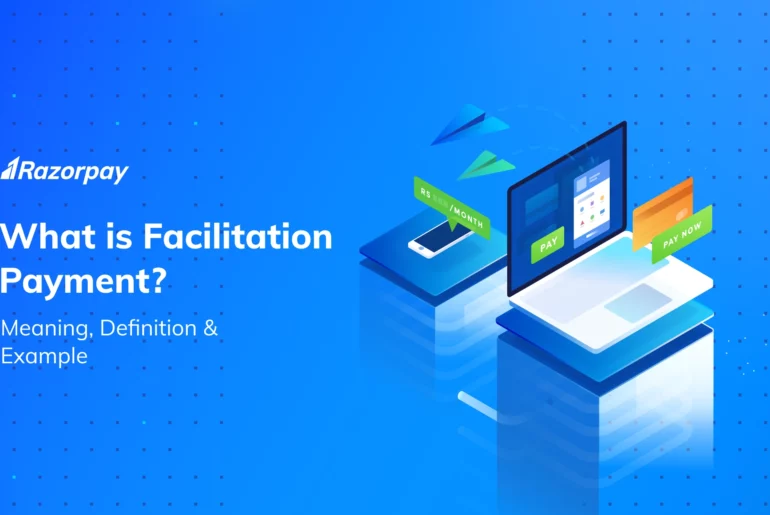What is Facilitation Payment?
Facilitation payment means the process where an online payment facilitator, often known as a payment gateway provider – India, streamlines and simplifies the payment acceptance process for businesses. These aggregators act as intermediaries between merchants and payment processors, making it easier for your business to accept payments from customers online.
These payments are typically made to low-level officials or intermediaries to speed up tasks and are sometimes disguised as fees for services like “loan facilitation services” or “payment gateway aggregators.”
While they may appear as legitimate fees, facilitation payments can be perceived as bribes because they undermine fair and transparent procedures, potentially fostering corruption and favouritism in both government and business transactions.
Related Article: Payment Aggregator Vs Payment Gateway
How Facilitation Payments Work?
The operational process typically involves the following steps –
- Merchant onboarding: The facilitator onboards your business onto its platform, collecting necessary documentation and setting up your merchant account.
- Payment integration: It provides you with the necessary tools and APIs to integrate payment processing into your website or mobile application.
- Customer payments: When customers make payments, the facilitator securely processes the transactions. It handles various payment methods like credit cards and digital wallets.
- Fund settlement: After processing, the facilitator ensures that funds are settled into your merchant account, often within a defined timeframe.
- Reporting and support: The payment facilitator offers reporting tools and customer support to assist you in managing your business transactions effectively.
Related Read: What are the Different Types of Digital Wallets?
The Key Difference between Facilitation Payment vs Bribes
The key difference between facilitation payment meaning and bribes lies in their intent and legality.
Facilitation payments are small, unofficial payments made to expedite routine services. They are often seen as a cost of doing business in some countries, but they are generally illegal in many jurisdictions.
Bribes, on the other hand, are illicit payments meant to influence or corrupt the actions of officials, business partners or individuals. They are considered illegal universally.
Laws against bribery are stringent and enforced worldwide, while facilitation payments may have legal nuances depending on local regulations.
Related Read: What is Merchant Onboarding, And How Does it Work?
What is an Example of a Facilitation Payment?
Online payment facilitators play a crucial role in various scenarios, such as online marketplaces, software platforms, and event ticketing, by simplifying payment processes.
For instance, consider an online marketplace like eBay. Facilitators serve as intermediaries between buyers and sellers, enabling secure transactions through an online payment processor like PayPal. By handling payment processing, dispute resolution and fund transfers, they facilitate smooth transactions, thus enhancing user experience.
This real-life example showcases how payment facilitation streamlines financial transactions across different domains, benefiting businesses and consumers alike.
Key Considerations Regarding Facilitation Payments
Facilitation payments, often considered unethical and, in some cases, illegal, involve small unofficial payments made to expedite routine services.
When dealing with facilitation payments, individuals and businesses should be aware of the legal aspects, as they are prohibited in many jurisdictions. Ethical considerations are paramount, as these payments can perpetuate corruption.
Potential consequences include damage to reputation and legal repercussions. Practical scenarios include navigating regulatory hurdles without resorting to facilitation payments, promoting transparency, and adhering to strict compliance standards to mitigate risks associated with such payments.
Conclusion
Facilitation payments are small, unofficial payments made to expedite routine services. They are often viewed as ethically questionable and illegal in many jurisdictions. They can undermine transparency and breed corruption.
Individuals and businesses need to prioritise ethical conduct, adhere to relevant laws and regulations, and seek alternative ways to navigate bureaucratic challenges.
By promoting transparency and compliance, we can foster a fair and equitable business environment while avoiding the risks and negative consequences associated with facilitation payments.
Frequently Asked Questions (FAQs)
1. Is a facilitation payment legal?
Facilitation payments are generally illegal in many countries, including India.
2. Which act creates an exemption for facilitation payments in India?
There is no exemption for facilitation payments in Indian law; such payments are considered illegal and unethical.
3. What are the disadvantages of facilitating payments?
Disadvantages of facilitating payments include perpetuating corruption, damaging reputation, and potentially facing legal consequences.
4. Why use a payment facilitator?
Businesses use payment facilitators to streamline payment processes, improve user experience and reduce administrative burdens associated with handling transactions.

